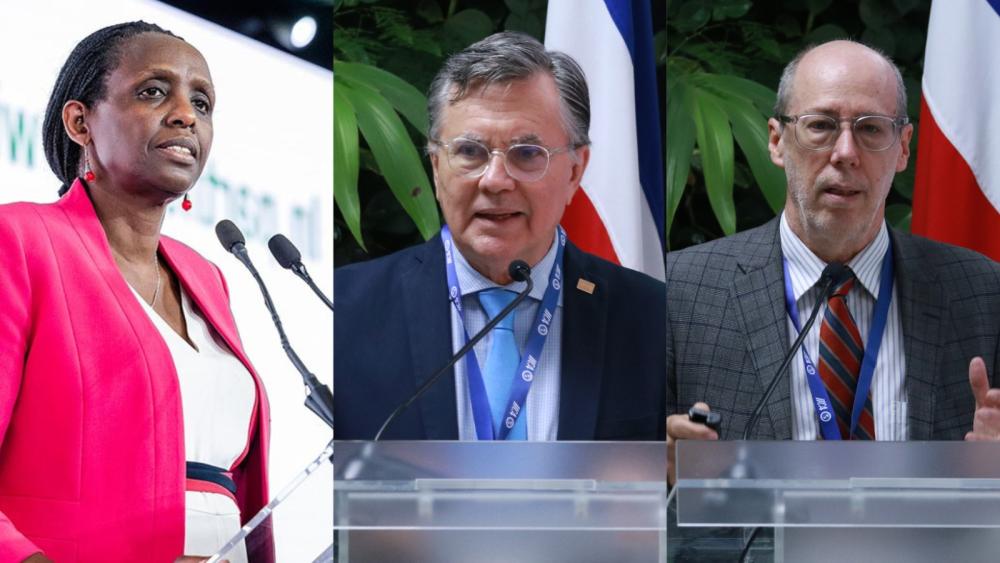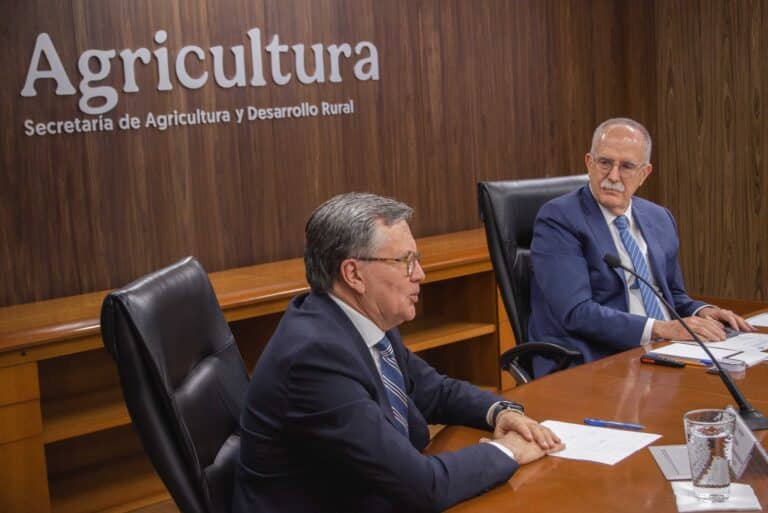The Alliance for a Green Revolution in Africa (AGRA) and the Inter-American Institute for Cooperation on Agriculture (IICA) have underscored their decision to work together to enhance the role of Africa and Latin America and the Caribbean as territories that are key to guaranteeing the planet’s food security and environmental sustainability.

San José, 16 September 2024 (IICA). The Alliance for a Green Revolution in Africa (AGRA) and the Inter-American Institute for Cooperation on Agriculture (IICA) have underscored their decision to work together to enhance the role of Africa and Latin America and the Caribbean as territories that are key to guaranteeing the planet’s food security and environmental sustainability.
Agnes Kalibata, President of AGRA, and Manuel Otero, Director General of IICA, took part in an online discussion with Jack Bobo, Director of the Food Systems Institute at the University of Nottingham, in the United Kingdom, in which all three agreed that the two continents need to deepen their reciprocal collaboration and that agriculture should be viewed as part of the solution to the challenges facing humanity; and not only for tackling the problem of food security, but also for the energy transition that is underway.
AGRA is an organization that works with public and private sector actors to improve the adaptation of African farmers and their production systems to climate change, so they can be more resilient to extreme weather events and adverse conditions. A former minister of agriculture of Rwanda and the UN Secretary-General’s Special Envoy to the 2021 Food Systems Summit, Kalibata has spearheaded the institution since 2014.
Kalibata and Otero decided to organize a discussion with Bobo – a professor recognized for his innovative work in science communication who will be receiving the Borlaug CAST communication award at the World Food Prize in October in the United States – to address issues related to the debate on the direction that the transformation of agri-food systems should take.
The academic opened the discussion by pointing out that agriculture has a huge impact on the environment and that, even so, some 800 million people, or ten percent of the world’s population, suffer from hunger.
“Ten percent of the population is hungry, and because of that, and because of the false information that circulates, many think that agri-food systems are part of the problem. But the reality is that ten percent is a much smaller proportion than in the past. In many regards, things are going well in agriculture, and that is why it is important to discuss the work of AGRA and IICA”, Bobo said.
The specialist underlined the fact that both IICA and AGRA have done very valuable work to ensure that the discussion on the future of agri-food systems is now at the top of the global agenda.
Kalibata explained that AGRA had a broad remit for its work in Africa. “We boost productivity and sustainability in agriculture, but also promote inclusive markets and appropriate public policies”, said the Rwandan former minister, who stressed the key role that technologies play in empowering small farmers.
“African agriculture is undergoing a process of transformation aimed at achieving greater resilience and higher production, not only to ensure food security but also to reduce poverty”, she explained.
“We have to deal with the strong impact of climate change on our continent”, she added, “and we must adapt. We can only do this by working on good agricultural practices, underpinned by a suitable environmental strategy”.
Otero said that both AGRA and IICA are committed to disseminating science-based good practices among family farmers on both continents.
“The Americas are a heterogeneous continent, with both food exporters and importers. Brazil exports ten dollars for every dollar it imports. Caribbean countries, on the other hand, barely generate three cents of exports for every dollar they spend on imports. That is why we have the mission of serving as bridges across the continent for the transfer of technologies, always paying close attention to the international scenario”, Otero remarked.
The IICA Director General also referred to the need for governments to deepen actions for greater integration between Latin America and the Caribbean and Africa.
“The physical distance between Africa and Latin America is only about 2800 kilometers”, he pointed out. “That is the same as the distance between Brasilia and Buenos Aires. Despite this physical proximity, there is little interaction. Our premise is that we need to look to the future and recognize that agriculture is the bridge that can unite us, since the two continents are destined to play an increasingly decisive role in the world’s food security and environmental sustainability”.
Kalibata underlined the importance of the Declaration on Sustainable Agriculture, Resilient Food Systems and Climate Action, signed during the last United Nations Climate Change Conference (COP 28) in the United Arab Emirates.
In that document, 160 countries recognized that unprecedented adverse climate impacts are threatening the resilience of agriculture and the ability of many, especially the most vulnerable, to produce and access food in the face of mounting hunger, malnutrition, and economic stresses.
“IICA has a very powerful voice in the Americas and the same is true of AGRA in Africa. We have to work together on policies that build resilience and transitions that are critical for our communities. Our priority must be to ensure that small farmers have access to technologies that enable them to adapt to climate change and continue feeding the world”, he concluded.
Bi-regional cooperation
In recent years, IICA and AGRA have forged a partnership based on the belief that the two continents face common challenges in advancing the transformation of their agri-food systems and can benefit greatly from joint work within the framework of South-South Cooperation.
Hence, together with the African Union Development Agency-New Partnership for Africa’s Development (AUDA-NEPAD), they organized the Africa-Americas Ministerial Summit on Agri-food Systems in 2022, which brought together ministers, deputy ministers and experts in the areas of agriculture, the environment, and science and technology from both continents at IICA’s headquarters in Costa Rica.
The cooperation efforts intensified this year when AGRA and IICA launched the joint bi-regional “Living Soils” initiative which, after its successful rollout in the Americas, is designed to restore degraded land, rehabilitate acidic soils, increase agricultural and landscape productivity, and improve climate resilience in African agri-food systems.
The Living Soils of the Americas project has been underway in several countries in the Western Hemisphere for four years, spearheaded by IICA and scientist Rattan Lal, considered the world’s leading expert in soil science.
More information:
Institutional Communication Division.
comunicacion.institucional@iica.int











